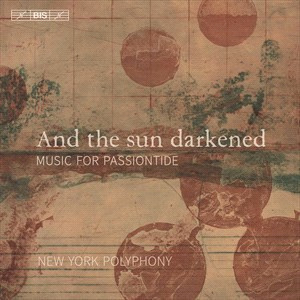

Loyset Compère (1445-1518): Crux triumphans Josquin des Prez (1450-1521): Tu Pauperum Refugium Andrew Smith (b. 1970): Salme 55 (Psalm 55) Adrian Willaert (1490-1562): - Pater noster - Ave Maria Cyrillus Kreek (1889-1962): Taaveti laulud (Psalms of David): Psalm 22, "Mu Jumal! Mu Jumal!" (My God, my God?) Loyset Compère: Officium de cruce, "In nomine Jesu" Pierre de la Rue (1452-1518): O salutaris hostia
The four member, standard setting chamber vocal ensemble New York Polyphony continues to transfix listeners with their pure, dynamically balanced and deeply expressive a cappella singing. It's hard to believe how a group of only four male voices can sound like much more than the sum of its parts. But as mellifluous and beautiful a sound they can project wouldn't be as captivating if the music itself wasn't of the highest standards. And of course selections of music by some of the early Renaissance masters who unlocked the secrets of polyphonic harmony makes for a wonderful program of that there is no doubt, especially when performed with veneration as it is here. But it's the inclusion of congruently compatible works written 500 years hence that raises the bar.
For example, British-Norwegian composer Andrew Smith (b. 1970) whose music is best described on his own website as "compositions that incorporate medieval textures and chant, which are reflected and inflected through his own contemporary idiom, blurring the modal clarity of plainchant with vivid cluster-chords and dissenting moments of chromatic or dissonant color." Like other works in the past his Salme 55 was composed specifically for New York Polyphony with their distinct sound in mind. It sets, as a point of departure, the single voice simple momentum of Gregorian Chant atop a slightly dissonant, plaintive and slowly repeating three-chord cadence that quite simply rivets your attention and haunts your mind long after audition. You can hear a short audio clip of it below. The same can be said about the music of Estonian composer Cyrillus Kreek whose music emphasizes simplicity, clarity, and the natural quality of the human voice. One could say in a way similar to some of the medieval composers like Pérotin, Dufay and Machaut for example, but with a 20th century soundscape. Unlike other collections like this you won't feel a jarring time-travel disconnect when listening to this recording.
Regardless of which century the members of New York Polyphony happen to explore at any given moment, you can sense their deep respect and understanding of both the text and music at all times. Their perfectly matched voices create a sonic canopy akin to the nave of a gothic cathedral, with audio engineering to match. Guaranteed you will feel the urge to listen to this recording many times over.
Jean-Yves Duperron - March 2021